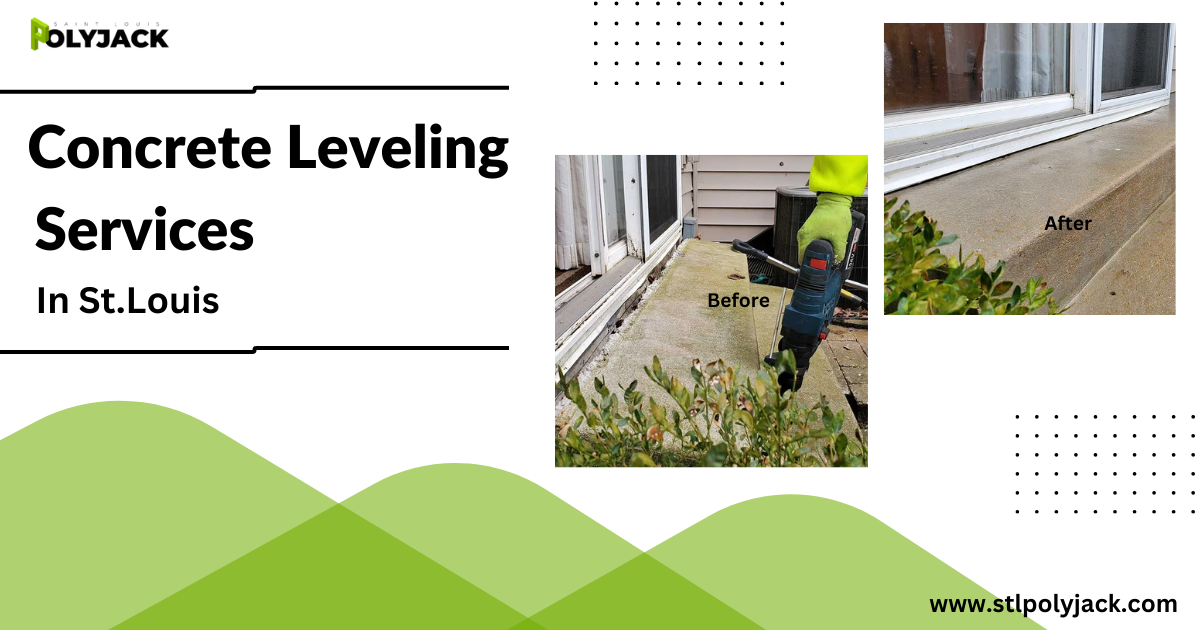Uneven concrete is more than just an eyesore—it’s a serious issue that can lead to safety hazards, drainage problems, and even long-term structural damage. Whether it's your driveway, sidewalk, patio, or basement floor, when concrete begins to sink, slope, or crack, it’s time to take action. Understanding the causes, potential risks, and the most effective repair solutions is key to maintaining the value and safety of your property.
If you’re a homeowner or property manager searching for a Concrete Leveling Company in St. Louis, this guide will help you understand what you're dealing with and what steps to take next.
Common Causes of Uneven Concrete
Uneven concrete typically results from changes in the soil underneath the slab. Some of the most common causes include:
1. Soil Erosion
Over time, water can wash away the soil beneath concrete slabs. Poor drainage or heavy rainfalls are often the culprits. When the soil disappears, there’s no longer a stable foundation to support the concrete, causing it to sink or crack.
2. Soil Compaction
If the ground wasn’t properly compacted before the concrete was poured, the soil may compress under the weight of the slab. This leads to gradual sinking, especially in areas that see frequent traffic or heavy loads.
3. Freeze-Thaw Cycles
In colder climates like St. Louis, the repeated freezing and thawing of moisture in the soil can cause it to expand and contract. This movement puts stress on the concrete above, leading to cracking and unevenness.
4. Tree Roots
Roots from nearby trees can grow under concrete surfaces, lifting sections of the slab as they expand. This can cause bumps and cracks in sidewalks, driveways, and patios.
5. Poor Drainage
Water pooling around the foundation or on concrete surfaces can gradually erode the subsoil and contribute to sinking slabs.
Risks of Ignoring Uneven Concrete
Many people delay repairing uneven concrete, especially if the issue seems minor. However, the longer you wait, the worse—and more expensive—the damage can become. Here are some key risks to consider:
● Trip Hazards
Uneven sidewalks and walkways are one of the leading causes of trip-and-fall accidents, posing a liability risk to property owners.
● Structural Damage
If the uneven concrete is near your foundation, it could be a sign of deeper soil instability that might lead to foundation damage.
● Water Drainage Issues
Sloping or sunken concrete can cause water to pool near your home or direct it toward your foundation, leading to water damage and mold.
● Lower Curb Appeal
Sunken or cracked concrete is unattractive and can hurt your property’s value, especially if you're planning to sell.
Repair Options for Uneven Concrete
The good news is that you don’t always need to replace your concrete entirely. Several modern techniques offer long-lasting solutions that are quicker and more cost-effective than full replacement.
1. Polyjacking (Polyurethane Foam Injection)
Polyjacking is one of the most effective solutions for lifting and leveling uneven concrete. A high-density polyurethane foam is injected beneath the slab, where it expands, fills voids, and lifts the concrete back into place. It’s fast, clean, and cures within minutes.
This method is especially ideal for homeowners in Missouri looking for a reliable concrete leveling company in St. Louis—it's minimally invasive and long-lasting.
2. Mudjacking
Similar to polyjacking, mudjacking involves injecting a slurry of cement and soil under the slab to raise it. However, it requires larger holes and may not last as long in wetter climates. While it’s more affordable upfront, polyjacking is often the more efficient long-term solution.
3. Concrete Grinding
If the unevenness is minor and limited to surface differences, concrete grinding can help smooth out the surface. However, this is typically a cosmetic fix and doesn’t address underlying soil problems.
4. Complete Replacement
If the concrete is severely damaged or crumbling, replacement may be the only option. Though expensive and time-consuming, it’s sometimes necessary when the integrity of the slab can’t be restored.
Choosing the Right Concrete Leveling Company in St. Louis
When dealing with uneven concrete, hiring experienced professionals is crucial. A qualified concrete leveling company in St. Louis can accurately diagnose the problem and recommend the most suitable solution.
Here’s what to look for in a contractor:
-
Experience with polyjacking or mudjacking
-
Positive customer reviews
-
Warranties on work performed
-
Knowledge of local soil and weather conditions
-
Free inspections or quotes
Choosing the right team means faster service, fewer headaches, and peace of mind knowing the problem is fixed for good.
Final Thoughts
Uneven concrete isn’t something to ignore. Whether it's a sunken driveway, a cracked sidewalk, or a sloping patio, the risks—from safety concerns to property damage—can escalate quickly. Fortunately, there are effective repair options available that don’t require full replacement.
If you’re noticing signs of uneven concrete on your property, reach out to a trusted concrete leveling company in St. Louis to schedule an inspection. Early action can save you time, money, and stress down the line.
Tamara Details
User Profile
- Full name
- Tamara
- Email address
- tamarasha1998@gmail.com
- Join Date
- 2025-04-15
- State
- City
- Pincode
- Address
- Follow us on Facebook
- Follow us on Twitter
- Website Name
- Bio

